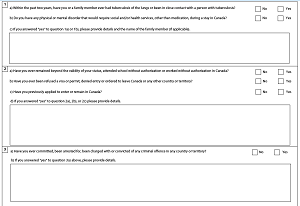
Five Immediate Steps IRCC Could Take to Make Forms/Application Processes More User Friendly
Recently in Sbayti v. Canada (MCI), 2019 FC 1296, Justice Pamel (a recent appointee to the Federal Court earlier this year) had a bit of
Award-Winning Canadian Immigration and Refugee Law and Commentary Blog

Recently in Sbayti v. Canada (MCI), 2019 FC 1296, Justice Pamel (a recent appointee to the Federal Court earlier this year) had a bit of

“Our lives have no meaning, no depth without the white gaze. And I have spent my entire writing life trying to make sure that the
In this piece I am going to talk about strategic voting or at least my own strategic vote this election. I also will touch on
A common situation in Canadian immigration law is when you make an application or a request for something such a reconsideration and you get back
In today’s bit of a fun exercise for people who like to dork out on these things, let’s take a look at the six-month on
I revised this post on 6 August 2019. Thanks to fellow colleague Tess Acton for pointing out R. 209 (the work permit parallel to R.222).
Dual intent is an important and increasing oft-used provision of the Immigration and Refugee Protection Act (“IRPA”) particularly for those applicants who straddle the pathway
Will Tao is an Award-Winning Canadian Immigration and Refugee Lawyer, Writer, and Policy Advisor based in Vancouver. Vancouver Immigration Blog is a public legal resource and social commentary.
he/his/him
Acknowledges that he lives and works on the traditional, unceded territories of the Coast Salish peoples – sḵwx̱wú7mesh (Squamish), sel̓íl̓witulh (Tsleil-Waututh), and xʷməθkʷəy̓əm (Musqueam) nations.
This site reflects my personal opinions and views only and should not be relied on and should be verified prior to any professional use. Please note that none of the information on this website should be construed as being legal advice. As well, you should not rely on any of the information contained in this website when determining whether and how to apply to a given program. Canadian immigration law is constantly changing, and the information above may be outdated. If you have a question about the contents of this blog, or any question about Canadian immigration law, please contact the Author.